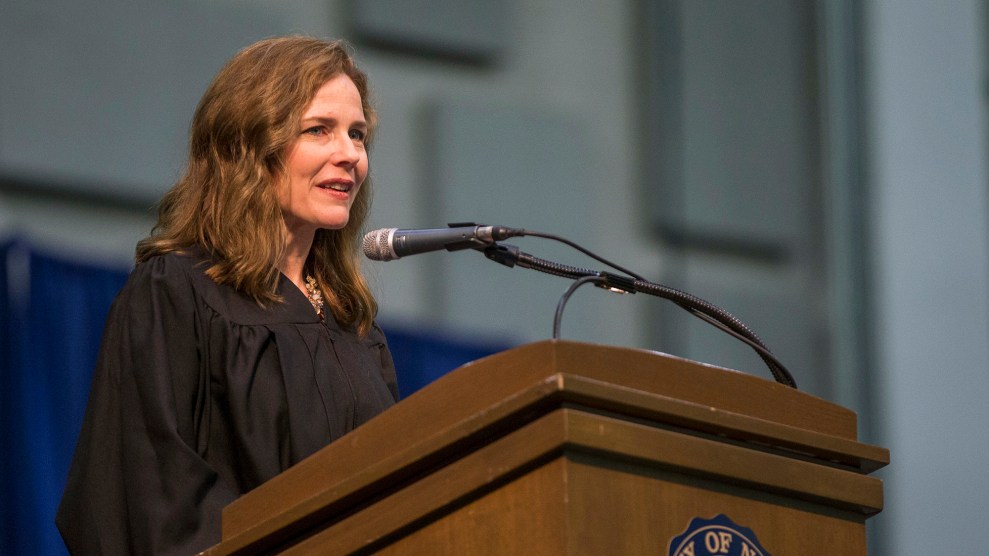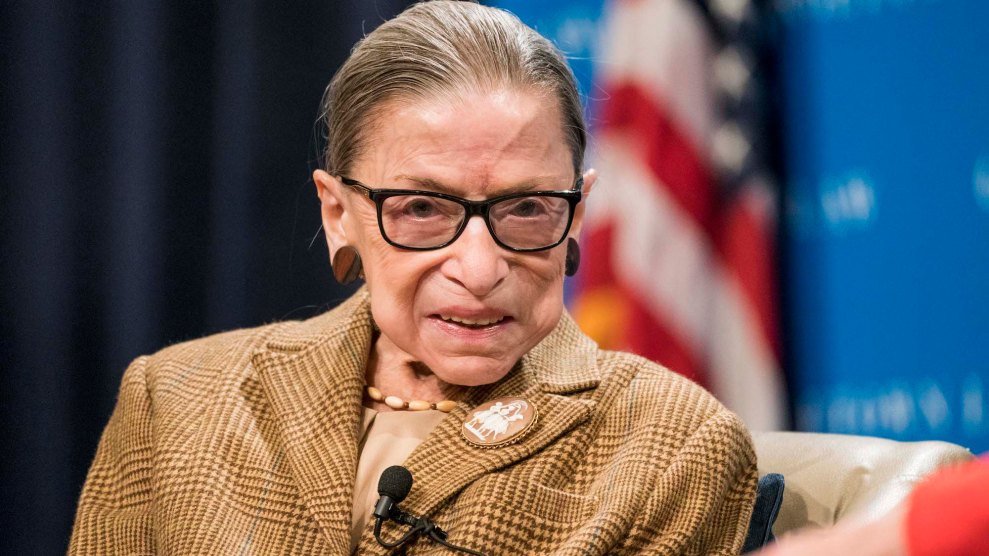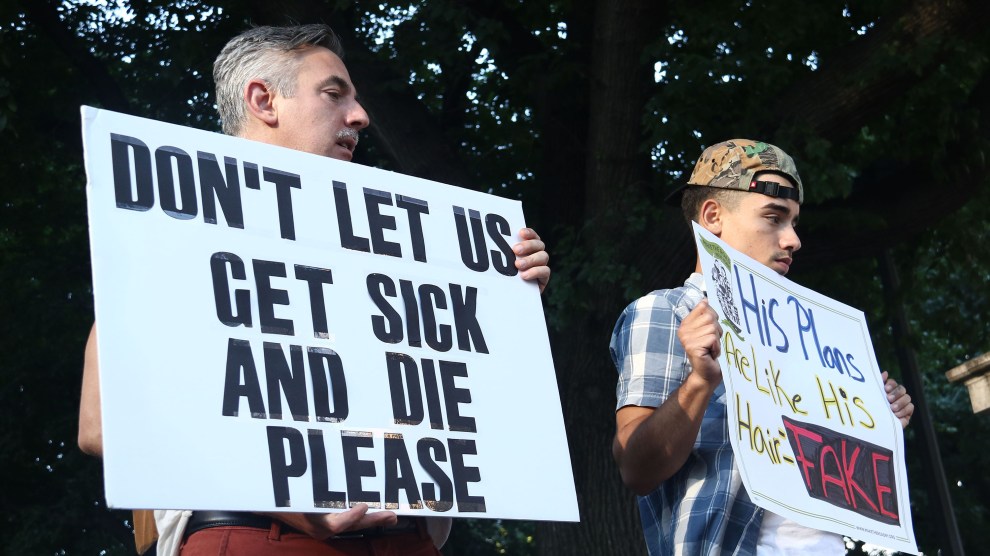
On May 19, 2018, Amy Coney Barrett, United States Court of Appeals for the Seventh Circuit judge, speaks during the University of Notre Dame's Law School commencement ceremony.Robert Franklin/South Bend Tribune via AP
Members of the Christian right are lobbying hard for President Trump to tap 7th Circuit Court of Appeals Judge Amy Coney Barrett to replace Justice Ruth Bader Ginsburg on the Supreme Court. A current Notre Dame law school professor, 48-year-old Barrett is a devout Catholic and mother of seven children, two of whom were adopted from Haiti and one who is a child with Down syndrome—all attributes that conservatives see as evidence that she will help overturn Roe v. Wade if confirmed. But Barrett brings another resume entry to the table that, while possibly enhancing her appeal to evangelicals, makes her an unusual candidate for the job.
She’s a member of People of Praise, a charismatic covenant community in South Bend, Indiana, that has been criticized by former members for being a religious cult. Though most of its members are Catholic, its practices, including speaking in tongues and faith healing, draw more from fundamentalist and evangelical Christianity than the Vatican. One of its most notable features is the submissive role played by women, some of whom were called “handmaids”—at least until the Handmaid’s Tale aired in 2017, At that point, the group started referring to them as “women leaders.”
Barrett has written and spoken publicly about being a devout Catholic lawyer, even saying that during her confirmation hearing that she would not enter an order of execution if she were a federal trial judge because it would conflict with Catholic Church teaching. In 2006, she gave a commencement speech at Notre Dame law school in which she told the grads, “Always keep in mind that your legal career is but a means to an end, and…that end is building the kingdom of God.” But Barrett has not publicly addressed her involvement with People of Praise.
That hasn’t kept reporters from writing about it. Recent news stories about Barrett’s unorthodox religious community have prompted Republican supporters to go on the offensive. “These ugly smears against Judge Barrett are a combination of anti-Catholic bigotry and QAnon-level stupidity,” Sen. Ben Sasse (R-Neb.) complained on Tuesday, suggesting that Democrats were spreading their bias through the media. “People of Praise is basically a Bible study—and just like billions of Christians around the world, Judge Barrett reads the Bible, prays, and tries to serve her community. Senators should condemn this wacky McCarthyism.”
But according to accounts of former members, People of Praise involves much more than studying the Bible. Indeed, some are deeply troubled by the possibility of one of the group winning a lifetime appointment to the Supreme Court. Two years ago, when Barrett’s name was floated as a potential candidate to replace retiring Justice Anthony Kennedy, a post appeared in a Facebook group of ex-members of charismatic Christian communities. “I don’t want a current member of this cult to be sitting on the Supreme Court,” the onetime People of Praise member wrote. “And it was not very many years ago that I admired them very much and was almost seduced into thinking they had something spiritually real and rich going for them.” More recently, another ex-member wrote, “I think we better start now fighting her nomination. I can’t quite imagine People of Praise on the Supreme Court.”
People of Praise emerged in 1971 after the Second Vatican Council efforts initiated by Pope John XXIII to bring the church into the 20th century. The council, which took place from 1962 until 1965, led to a loosening of the rules: Latin mass became optional, nuns could toss the habit, and the Vatican encouraged Catholics to engage with other faiths. Encouraged by Vatican II, the founders of People of Praise embraced the idea of creating a new faith community that drew on practices more common in Protestant evangelical churches. But after a few years, the group’s focus evolved in much the same way as those of other American evangelical churches, and leaders grew to emphasize the community as a bulwark against sin and the social upheaval in the rest of the country.
Most of its members are Catholic, but People of Praise is ecumenical, and any Christian can join. But joining the group requires a major commitment and a willingness to submit to a lay spiritual adviser known as a “head,” who has an outsized role in one’s life and relationships. After several years of exploration, prospective members must agree to a formal covenant and pledge to attend to each other’s spiritual, material, and financial needs—as well as attend many meetings, even as they still go to Mass or otherwise remain active in their regular churches. Members are supposed to consult their head on nearly every aspect of their lives—from raising children to buying a car. A woman’s personal head is her husband, and women aren’t allowed into serve in top leadership roles in the community.
People of Praise often live close together and unmarried people sometimes live with a married couple. There are specific courtship rituals—dating isn’t allowed until a member has been thoroughly counseled by a head. It’s positively socialist in many ways, as members are required to tithe at least 5 percent of their earnings, share property, and submit their family budgets to their head.
Former members have described it as oppressive to women, and one woman has suggested that it creates a hospitable environment for controlling and abusive men. Coral Anika Theill, who wrote a memoir called BONSHEA: Making Light of the Dark, discusses her time with People of Praise and her sense that it had a role in facilitating the domestic violence she says she suffered. Her story highlights another feature of the community: Once in, it’s tough to exit. “When I left the community in 1984,” she writes, “I was threatened and told that they would put me in a mental institution if I did not submit to the ‘authorities God had placed over me.’”
Perhaps the most prominent voice regarding the problems with People of Praise is Adrian Reimers, a longtime Notre Dame university professor who was one of the group’s original founders in 1971. In an article published in the Cultic Studies Journal in 1986, he said the tight psychological and social controls over it maintains over its members led his family to leave the community, which he believed had strayed from its Catholic roots. At one point, he writes, other leaders even discouraged him from seeking spiritual advice from priests, suggesting that the church was secondary to the covenant community.
Reimers provides some insight into the work of the handmaids in reinforcing the group’s traditional gender roles. “Besides working with women who want to help or whose husbands feel they need it, the handmaids try to foster a particular model of womanliness within the community,” he writes. “There is a strong emphasis on the manly, occasionally to the point of ridiculing the ‘wimp.’”
According to Reimers, People of Praise teaching also provided some pretty sexist counseling for its male leaders on how to deal with women. “According to a teaching that has been circulating among the community heads, women are by nature manipulative,” he recounts. “This is one of the effects of Original Sin on them. The wise husband will factor this into his relationship with his wife, recognizing that much of what she does is insincere. To deal with this, the husband should distrust her motives and instead draw closer to his head and the men in his men’s group.”
Women, he notes, were discouraged from having independent ideas. “At a women’s retreat one handmaid taught (with the approval of the coordinators) that one manifestation of the sin of pride is the failure to submit one’s thoughts and opinions to the heads of the community for correction,” Reimers writes.
People of Praise has pushed back against these characterizations, particularly as it has come under scrutiny because of Barrett’s possible elevation to the Supreme Court. In 2018, after Justice Kennedy retired, the group issued a statement responding to some of the media coverage, particularly on the role of women. “The People of Praise recognizes that men and women share a fundamental equality as bearers of God’s image and sons of God in Christ,” it said.
But Reimers isn’t the only former member who has characterized the group as oppressively patriarchal. In 2008, many years after Reimers first started publishing his critiques, Eric Stone, a student at the University of Minnesota, wrote an article in a campus publication about his time in the campus chapter. Like Reimers, he reported that the organization took a dim view of LGBT people and women.
“After some time in the POP,” he writes. “I started to realize that the revolution of Jesus Christ that was prophesied by the group was actually a revolution of oppression and control. The POP is comprised almost entirely of white upper-middle class Americans. Of the hundreds of members I met during my time with the POP, I met only one that was Black. I later found out that he was merely a guest at one of the community meetings and not affiliated with the POP. Furthermore, no active homosexuals are allowed, and if they ‘come out’ they are encouraged to undergo conversion therapy or are forced to leave.”
What’s notable about the defection stories is that People of Praise has never had very many members to begin with—only about 1,700 nationally, with a few hundred congregating with Judge Barrett in South Bend, where Notre Dame University was its spiritual hub. But Barrett has stuck it out, a sign that she is likely a true believer. Her ties to Praise of People run deep. Her parents are members; her father Mike Coney has been a member of its top leadership, serving on the board of governors, and her mother was reportedly a handmaid. She has six siblings, many of whom are also in the group, have done missionary work for it, and are married to other members. Barrett’s husband, Jesse Barrett, is a fellow Notre Dame law school grad, former assistant US attorney, and a lawyer in private practice—and a member of People of Praise.
Barrett has also served on the board of the Trinity School at Greenlawn, a People of Praise school for grades 6 through 12 in South Bend, where she reportedly has sent her own children, who range in age from 8 to 19. While co-ed, Trinity strictly segregates students by gender in the classroom. Students are discouraged from getting too close to the opposite sex; the school handbook explicitly frowns on dating, and any promiscuity seems to be grounds for expulsion. “Though it is natural and consistent with human development that students, experience sexual attraction, we discourage the formation of exclusive relationships,” the handbook says. And pity the poor Barrett child who might come out as gay or trans.
“At this age, some students may also experience same-sex attraction. We believe that it is unwise, however, for teens to prematurely interpret any particular emotional experience as identity-defining,” the Trinity handbook states. “We believe that such self-identification at a young age can lead to students being labeled based solely upon sexuality, generate distraction, create confusion, and prevent students from experiencing true freedom within the culture of the school.” (The school handbook also outlines a strict ban on pranks in any form, suggesting a serious lack of a sense of humor.)
It’s not anti-Catholic for Senate Democrats to ask Barrett to explain her relationship with or role in People of Praise. Wondering if she was a handmaid—and what that might mean in a Supreme Court justice—is a far cry from asking John F. Kennedy whether he had more loyalty to the Pope than the United States. As she told Notre Dame’s Class of 2006, “First, before you take any job, particularly one that requires a move, pray about it. St. Ignatius of Loyala observed that when presented with options, most people choose what they want to do first, and it’s only after the choice is already made that they go to God and say, ‘How can I serve You in the Situation I’m in?’ It’s the rare person who consults God before making a choice.”
















